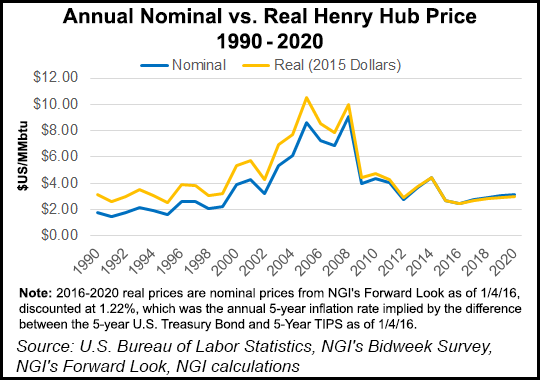NGI Archives | NGI All News Access
Low Natural Gas, Oil Prices Biggest Challenge to U.S. Energy Sector This Year, Say CFOs
Low natural gas and oil prices will be the biggest challenge for the domestic energy sector this year, with asset sales likely to continue and unconventional development less of a priority, according to a new survey of industry financial chiefs.

BDO USA LLP’s annual Energy Outlook Survey issued on Monday reported that 85% of the CFOs questioned expect low prices to be their companies’ biggest threat this year. Seventy-five percent also expect merger and acquisition (M&A) activity to increase this year, up from 56% a year ago. Close to one-half said undervalued assets will be the primary driver of M&A, while increased pessimism about the sector’s ability to access capital and credit also may catalyze deal activity.
“Throughout 2015, we saw many M&A players hesitant to engage in deal activity, likely because sellers hoped the bust cycle would balance out throughout the year and drive valuations up,” said BDO’s Charles Dewhurst, who leads the natural resources practice. “However, as we enter the new year, they are letting go of the idea of rapid recovery and may look to sell before valuations bottom out further.”
The nationwide survey was conducted from last September through November.
The percentage of financial chiefs who feel worse about their company’s access to capital has more than doubled, from just 20% in 2015 to 45% this year. During the bank determination period in October, many exploration and production companies (E&P) heavily in debt saw their borrowing bases reduced. Close to half (45%) of the CFOs whose companies are experiencing project delays or terminations cited a lack of capital as a leading cause.
Debt financing is becoming increasingly challenging, and many E&Ps have increased their reliance on private equity (PE) to remain afloat.
More than half (55%) said they are likely to use PE as a source of outside capital in the coming year, up from 50% in 2015 and 40% in 2014.
“For their part, private equity firms view the current marketplace as an excellent opportunity to deploy capital and pick up inexpensive assets — and reap the rewards when oil prices rebound,” BDO researchers said.
The survey also found that the energy sector is going to be “more conservative” in funding new investments during 2016.
For example, the Obama administration last year moved forward to begin oil and gas lease sales in the Arctic and Atlantic last year, but “only 1% of CFOs say they will be increasing capital investment in offshore exploration, down from 23% in 2015.”
Unconventional oil and gas drilling also is not a high priority this year, the survey found. The number of CFOs expecting their companies to increase investments in unconventional plays dropped from 47% last year to about 33% in the latest survey.
Labor costs and more staff cutbacks also are expected to be top issues confronting the energy sector.
“In addition to cutting back on investments, oil and gas companies are making tough decisions as contracting prices force them to scrutinize their labor costs. Seventy-one percent of CFOs hope to keep staffing levels consistent with last year, while 9% of CFOs say they are likely to reduce their labor force in order to increase profitability, up from 1% last year.”
Employees who survive the job cuts may feel the impact of tightening budgets, with 57% expecting staff bonuses to be smaller for fiscal year 2015.
“Executives must balance the need to bring costs down with the very real risk that a large reduction in labor force may catch them on the back foot when prices begin to climb again,” said BDO’s Jim Willis, who is senior director of compensation for the Global Employer Services group. “The industry is threading this needle for now by effectively implementing a hiring freeze, but if prices remain low for much longer, more companies may need to seriously evaluate reducing their headcount.”
The focus on environmental regulations is waning, the survey found.
“Given the state of the industry, it’s unsurprising that concerns about environmental compliance risks have lessened considerably, with about one in five CFOs citing it as the primary area of focus for their risk reduction activities, compared to 61% a year ago.”
Investing in environmentally friendly E&P technologies also has grown “less feasible for many companies,” with only 22% planning to increase their spending in this area, down from 35% in 2015.
© 2024 Natural Gas Intelligence. All rights reserved.
ISSN © 1532-1231 | ISSN © 2577-9877 |
